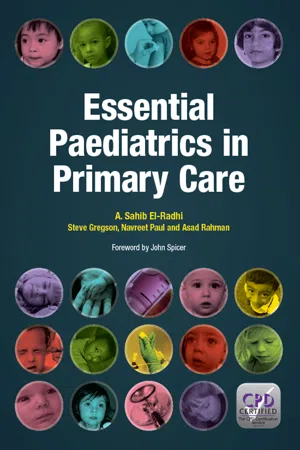
Essential Paediatrics in Primary Care
A. Sahib El-Rahdi, Steve Gregson, Paul Navreet, Asad Rahman
- 336 Seiten
- English
- ePUB (handyfreundlich)
- Über iOS und Android verfügbar
Essential Paediatrics in Primary Care
A. Sahib El-Rahdi, Steve Gregson, Paul Navreet, Asad Rahman
Über dieses Buch
'Anyone practising generalist paediatrics should have the material within these chapters either hard-wired in, or at the fingertips. This book is ideal for the primary care bookshelf...The authors have ensured that clinicians' paediatric knowledge and skills can only grow with familiarity of their material.' From the Foreword by John Spicer Essential Paediatrics in Primary Care covers the entire breadth of paediatric practice. Written by a team with frontline experience of the challenges and dilemmas faced in diagnosing and treating children in primary care, this practical text contains clear, evidence-based guidance about managing children in primary care and considers when referral to hospital is appropriate. The concise, list-based format enables a rapid, confident and knowledgeable diagnosis to be reached in the short time available in general practice. This reference book is invaluable for General Practitioners and GP trainees wanting to keep abreast of recent progress in paediatric care, but is also ideal for nurse practitioners, health visitors, medical students and paediatricians considering a career in general practice.
Häufig gestellte Fragen
Information
CHAPTER 1
The newborn
NEONATAL HEALTH PROMOTION
Age | Intervention |
|---|---|
Soon after birth |
|
5–6 days old |
|
First month |
|
New-birth visit (around 12 days) |
|
6–8 weeks |
|
3 months |
|
4 months |
|
Age | Immunisation |
|---|---|
2 months | DTaP/IPV/HiB (1st dose), plus |
PCV in a separate injection, plus | |
Rotavirus (orally) | |
3 months | DTaP/IPV/HiB (2nd dose), plus |
Men C in a separate injection, plus | |
Rotavirus (orally) | |
4 months | DTaP/IPV/HiB (3rd dose), plus |
Men C in a separate injection, plus | |
PCV (2nd dose) in a separate injection | |
12–13 months | HiB/Men C (as one injection), plus |
MMR (as one injection), plus | |
PCV (3rd dose) in a separate injection | |
3 years + | Pre-school booster of DTaP/IPV, plus |
MMR | |
12–13 years (girls) | HPV in three injections: the 2nd one is given 1–2 months after the 1st; and the |
3rd is given about 6 months after the 1st | |
13–15 years | Td/IPV booster |
Men C booster in a separate injection |
NEONATAL EXAMINATION (THE BABY CHECK)
- ➤ Detect congenital abnormalities which may be present in 3–5% of infants. These should be explained to parents, recorded and referred if appropriate.
- ➤ Establish a baseline for subsequent examination.
- ➤ Ensure there are no signs of infection or metabolic disease.
- ➤ Perform measurements of weight and head circumference (HC) and plot them on a centile chart. A newborn’s weight may decrease 10% below birthweight in the first week, but should regain or exceed birthweight by 14 days of life. Newborns should grow at approximately 25–30 g/day during the first three months.
- ➤ Review of family history, including maternal diseases, sexually transmitted disease, medications (Box 1.1), and alcohol and tobacco consumption.
- ➤ Parental concerns should be elicited.
- ➤ General examination: Much information can be gained by simple observation without disturbing the child. Is the general appearance normal? Does the baby look well nourished? Are there any dysmorphic features?
- Anaesthetics and sedatives, e.g. halothane causing alteration of DNA synthesis in vitro reported to cause skeletal defects
- Anticoagulants (e.g. warfarin causing an embryopathy with growth retardation, skeletal and CNS abnormalities)
- Antibiotics (e.g. aminoglycosides causing 8th cranial nerve toxicity; tetracyclines producing dental discolouration, enamel hypoplasia)
- Cytotoxic drugs (e.g. methotrexate causing craniofacial anomalies)
- Alcohol, causing fetal alcohol syndrome
- Tobacco smoking, causing an increased incidence of growth retardation and developmental delay
- Oestrogens, causing precocious puberty and cervical/vaginal adenocarcinoma near puberty
- Anticonvulsants (e.g. phenytoin causing fetal hydantoin syndrome)
- Addicting drugs (e.g. cocaine causing eye and skeletal defects)
- Psychotherapeutics (e.g. lithium causing heart valve defects, Ebstein’s anomaly)
- Analgesics (e.g. aspirin associated with skeletal and heart defects, cleft lip and palate, hypospadias)
- ➤ Skin:
- ➣ Colour is an important index of the function of the cardiorespiratory system. Normal colour in Caucasian infants is reddish pink. Infants of diabetic mothers are pinker than average.
- ➣ Evidence of jaundice, best detectable in bright natural light.
- ➣ Peripheral cyanosis, caused by peripheral circulatory instability.
- ➣ Mottling (cutis marmorata) may be due to circulatory instability.
- ➣ Capillary haemangioma (see ‘Birthmarks’ below).
- ➤ Skull (Fig 1.1):
- ➣ Palpation of the suture lines and the size and tension of the anterior fontanelle is performed. Great v...